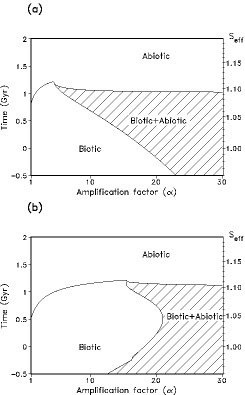 |
||||
| Werner von Bloh
|
|||||
| Biotic feedback extends the life span of the biosphere |
|
||||
T. M. Lentona and W. von Blohb a Centre for Ecology and Hydrology, Bush Estate, Penicuik, Midlothian EH26 0QB, UK. bPotsdam Institute for Climate Impact Research (PIK), Telegrafenberg, P.O. Box 60 12 03, 14412 Potsdam, Germany. The Sun is becoming more luminous with time and will eventually overheat the biosphere. However, life cools the Earth by amplifying the rate of silicate rock weathering and maintaining a low level of atmospheric CO2. Recent studies indicate a much stronger biotic weathering effect than in models used to estimate the life span of the biosphere. Here we show that the resulting feedback lengthens the survival of complex life by delaying the loss of CO2 from the atmosphere. The weathering biota can potentially maintain the Earth in a habitable state when otherwise it would be too hot for them. If so, catastrophic warming rather than gradual CO2 starvation will terminate complex life. Despite the possibility of an irreversible collapse, the current biosphere should remain resilient to carbon cycle perturbation or mass extinction events for at least 0.8 Gyr and may survive for up to 1.2 Gyr. Full text of article including figures as a PDF-file (352 KByte).
Figure: Earth system state as a function of biotic amplification factor (alpha) and time or corresponding solar luminosity (Seff). Total biotic amplification of weathering is beta = 1.56 alpha. In the `Biotic' region, only the solution with life is stable. In the `Abiotic' region, only the solution without life is stable. `Biotic + Abiotic' indicates the bi-stable regime in which solutions with and without life are both stable. (a) Geostatic case. (b) Geodynamic case. |
|||||
|
|
|||||
| Impressum © PIK 2006 |
